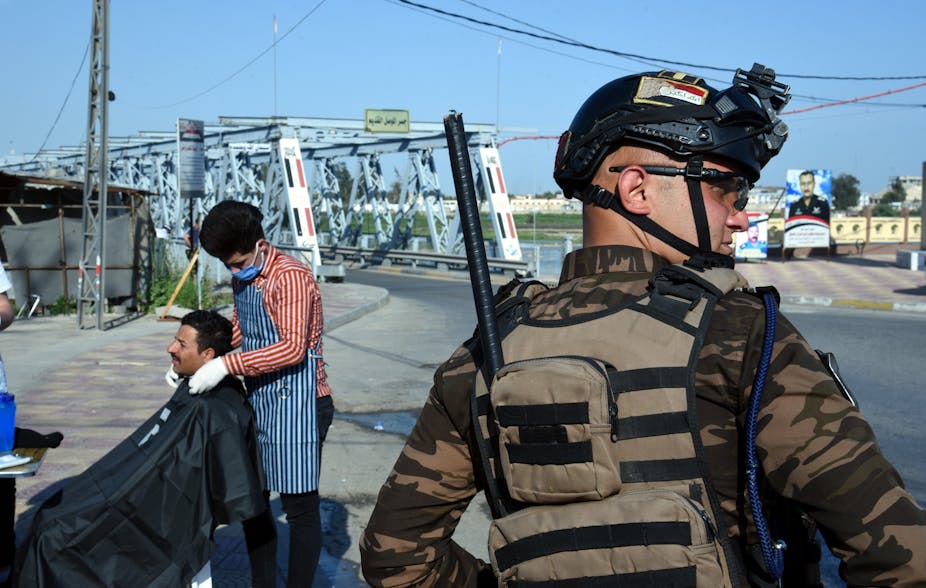It’s been 15 years since the UN unanimously endorsed the Responsibility to Protect, under which all countries have a responsibility to protect people around the world from four crimes: genocide, crimes against humanity, ethnic cleansing and war crimes. Together, these are commonly known as mass atrocities.
Since its inception, there have been calls to expand the remit of Responsibility to Protect beyond these four crimes to include issues such as natural disasters and refugees A new debate has now sprung up about whether the Responsibility to Protect should be extended to cover pandemics such as coronavirus.
We do not believe that the global spread of COVID-19, the disease associated with the new coronavirus, means it should come under the remit of Responsibility to Protect. The pandemic does not constitute one of the four crimes.
Our concern is that triggers of mass violence in the past have included a wide range of events, such as changes to the strategic environment. To be clear, pandemics do not cause mass violence – the spread of SARS and Ebola in the 21st century are proof of this.
Yet historically, the spread of diseases such as the plague and cholera has sometimes increased levels of hatred and seen mass violence erupt. Regarding COVID-19, our primary concern in the current is that political elites and non-state armed groups may manipulate this event to perpetrate mass atrocities, especially in countries that have experienced violence in their recent past.
Under the terms of Responsibility to Protect, the international community should closely monitor the response to the crisis in these countries as part of its commitment to prevent the four crimes. As Simon Adams, chief executive of the think tank the Global Centre for the Responsibility to Protect, recently argued: military groups should not be allowed to “weaponise the pandemic”.
Countries at risk
A key question then is where the international community should focus its attention. To help answer this, we’ve focused on 36 countries that have experienced the four crimes in the 21st century.
The list is an aggregate that we put together of countries identified by the Global Centre for the Responsibility to Protect, the International Coalition on the Responsibility to Protect and the International Criminal Court. We then include the ranking of these 36 countries in the latest Global Health Security Index report, which gives an overview of a country’s health security. The graph below shows the ranking position for these 36 countries, with those on the left ranked lowest on the index – so with the poorest health security.

The Global Health Security Index offers a general overview of health security and doesn’t provide insight into a country’s ability to fight the specific threat posed by COVID-19. That said, there are three points which strike us from this analysis.
First, the greatest concern are the 15 countries in the bottom quarter of the index: Burkina Faso, Burundi, Central African Republic, Democratic Republic of Congo (DRC), Eritrea, North Korea, Iraq, Libya, Mali, South Sudan, Sudan, Somalia, Syria, Venezuela and Yemen.
In all of these countries there is a lack of health system capacity. They are unable to deal with existing demands, let alone increased numbers. In Libya alone, reports of 17 cases led the UN migration agency to warn that a broader outbreak could be “truly catastrophic” for internally displaced people in the country. Similar outbreaks could be equally devastating in any one of the countries listed above.
Second, is the regional dynamics. Of these 15 countries, ten are on the African continent, which has been described as particularly vulnerable to the pandemic. A critical concern is the fact that many of the most vulnerable countries are neighbours. The DRC shares a border with Burundi, Central African Republic and South Sudan. The disease could move quickly throughout these countries – as it did across Europe – and refugee flows raise serious concerns over how neighbouring governments will react and whether violence could be used to deter refugees.
Close monitoring
Third, this does not mean that the rest of these countries are “safe” or that they do not need monitoring. The third point is that the decisions made by political elites in each country will be a determining factor of whether mass violence emerges. For example, the Philippines, ranked 53 in the index, is ruled by a president who has been accused of crimes against humanity in his war on drugs. Rodrigo Duterte has now reportedly given police power to shoot to kill those violating the country’s lockdown.
All these countries need close monitoring because mass violence has been part of their recent history.
If governments or militia groups in any of these countries try to use the coronavirus pandemic as an opportunity to perpetrate mass atrocities, then the international community should use all the means at its disposal to make sure the state in question fulfils its primary responsibility to protect. Unless the world remains informed and vigilant, then COVID-19 may become the latest trigger for mass atrocity crimes.

